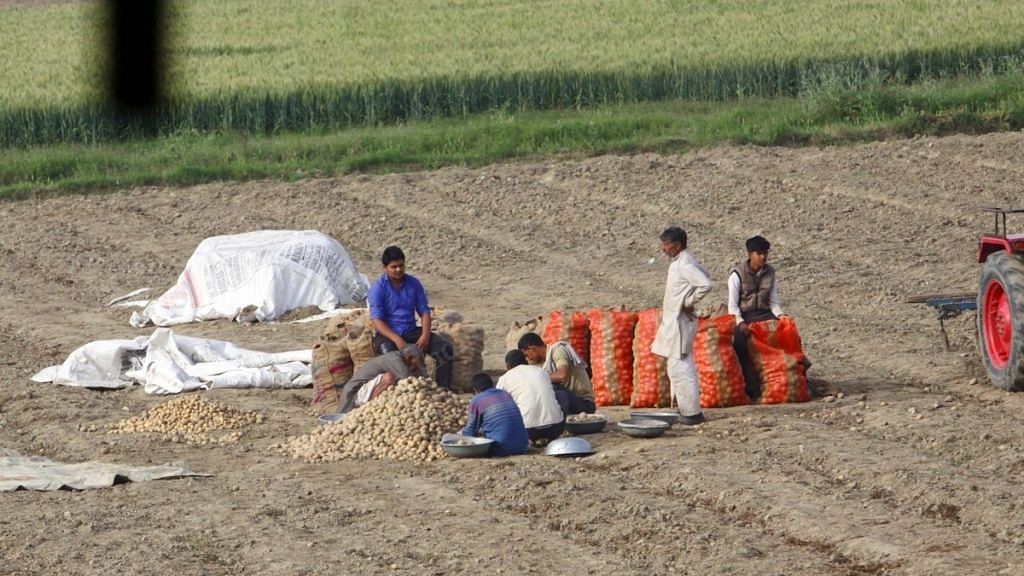Baghpat: If there was one thing 29-year-old dairy farmer Shashank Tyagi was sure of, it was that the nationwide lockdown wouldn’t affect his business in his Baghpat village because milk is “as essential a commodity as there can be”.
But Tyagi was in for a rude shock when supplying milk to shops in local areas and other cities became a severe obstacle to his business in Bhanera village of the Uttar Pradesh district due to the lockdown.
On Tuesday, Prime Minister Narendra Modi announced a 21-day complete lockdown across the country in a bid to tackle the coronavirus threat to India.
In the last 10 days, Tyagi claimed to have suffered a loss of at least Rs 70,000. “Earlier, if I sold milk for Rs 60 per litre, now I am having to sell it for Rs 40 per litre,” he said.
He is one among the Baghpat dairy farmers who sell their milk to shops and markets in neighbouring Delhi. But since the lockdown began earlier this week, his regular customers aren’t buying.
“Most of my customers in Delhi own sweet shops and would use the milk to make mewa, some others would make dairy products like paneer. Now, either these sweet and grocery shops aren’t opening or even if they are, people are hesitant to buy food items from shops due to the coronavirus,” he said.
As cities like Delhi face a complete shutdown, farmers like Tyagi in smaller villages who supply the raw materials across sectors are dealing with overwhelming ripple effects on the rural economy.
“I have six cows. If I don’t get my money soon, I won’t be able to feed them properly, and they might even die,” Tyagi said.
Sugarcane ‘dying in the field’
The farmers in Baghpat district, which is known for its sugarcane, are facing severe roadblocks in transporting their produce to sugar mills, most of which are shut anyway.
“Police isn’t allowing any transportation,” said Prince Tyagi, a 38-year-old farmer. “Moreover, most of the sugar mills are completely shut. So our sugarcane is just dying in our fields.”
But labourers continue to work in Prince’s farm even as he fears their hard work may all go in vain. “We just can’t keep sitting at home. I am continuing to work on my farm for now, hoping the situation will soon get better. I want to be ready with the sugarcane when the lockdown is withdrawn,” said Tyagi.
Another sugarcane farmer, 38-year-old Neeraj Tyagi, shared similar concerns. “If mills don’t start operating any time soon, does that mean our sugarcane will just die here? The government must intervene,” he said.
But just as with dairy products, the scepticism of customers to purchase sugar items, like jaggery, is hitting the farmers’ income. “Even if mills do start operating, until and unless regular people come out to buy sugarcane, jaggery, sugar, we will continue to be at loss,” said Neeraj.
Satya Pal Singh, BJP MP from Baghpat constituency, acknowledged that the lockdown has aggravated the farmers’ problems.
“I am aware that our farmers are struggling a lot, sugarcane and potato farmers, especially. I am releasing some funds from my MPLADS for their relief, and will also arrange cold storage facilities for the farmers,” Singh told ThePrint.
MPLADS, or Members of Parliament Local Area Development Scheme, allows MPs to spend Rs 5 crore on their constituency per year for developmental work.
Also read: 3 critical steps Modi govt must take to protect people and economy during Covid-19 lockdown
Price hikes
While farmers are struggling to sell their produce to shops and markets outside the villages, local kirana (provision) stores are allegedly hiking the prices of items.
“They know that people are desperate at this point. They are exploiting the situation and selling basic items like wheat and rice at twice the price,” Narendra Sharma, a labourer told ThePrint. “This will inevitably give rise to a black market amid the lockdown.”
Baghpat District Magistrate Shakuntala Gautam acknowledged such incidents, and said the administration is responding to them.
“At least one such incident was brought to our attention, and we immediately sent our team to the spot and stopped all such illegal acts,” said Gautam, adding the district office has released vehicles for delivering grocery items to homes.
Medical challenge
The lockdown presents a much bigger economic concern for the farmers in the district than the coronavirus pandemic that caused it.
“We don’t have enough infrastructure to take proper medical care here. So there is no point worrying about things out of our control,” said a local farmer.
The district, however, seems ill-prepared even for the outbreak, which has until now claimed 17 lives across the country and infected nearly 650 people.
According to Baghpat’s Chief Medical Officer R.K. Tandon, there are barely two hospitals to treat the potential cases of coronavirus. “The second hospital is also only partially ready.”
Tandon added, “We also don’t have any chest specialists, who are ideally supposed to treat coronavirus patients. We have a total of three physicians who have been given the responsibility of treating possible cases.”
Baghpat doesn’t have Covid-19 testing facility, so it sends blood samples of suspected cases to the designated hospitals in Lucknow, which then communicate the results to Tandon’s office.
There has been so far one positive Covid-19 case in Baghpat — a 32-year-old man who recently returned from Dubai. “We have teams on high alert. Anyone who is known to have returned from a foreign country is put in quarantine,” Tandon said.
Also read: Modi’s demonetisation will be of use during the coronavirus lockdown
